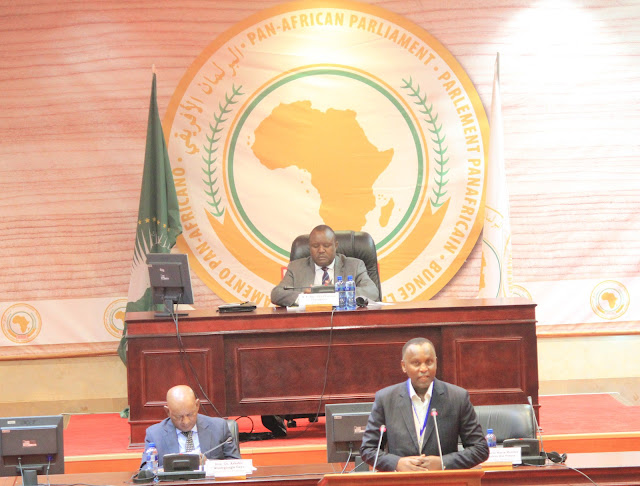|
Getting your Trinity Audio player ready…
|
The Pan African Parliament (PAP) is working on legislation to strengthen the protection of the rights of all migrants as an essential element that is at the heart of migration governance.
Today, a report on the joint seminar between the Pan-African Parliament (APAP) and the African Union Labour Migration Advisory Committee (AU-LMAC) is being presented in Midrand, South Africa, the seat of the PAP.
As part of the first statutory meeting of the Permanent Committees of the Pan-African Parliament, a joint seminar was organized on 29 August 2022 at PAP headquarters in Midrand, Johannesburg, the Republic of South Africa by the Committee on Trade, Customs and Immigration Matters in collaboration with the African Union Labour Migration Advisory Committee (AU-LMAC) on the theme: “Bridging the gaps in the protection of migrant workers in Africa through advocacy for the use of legal instruments: the role of the Pan-African Parliament and the African Union Labour Migration Advisory Committee.”
The seminar involved the participation of six Permanent Committees of the Pan-African Parliament, namely:
- Committee on Trade, Customs and Immigration Matters;
- Committee on Health, Labour and Social Affairs;
- Committee on Transport, Industry, Communications, Energy, Science and Technology;
- Committee on Gender, Family, Youth and People with Disabilities;
- Committee on Justice and Human rights;
- Committee on Rules.
The official opening involved three main speakers and below are the highlights.
Firstly, there was the welcome address by the Chairperson of the Committee on Trade, Customs, and Immigration Matters, Sen. John Bonds Bideri. In his address, the Chairperson made reference to the functions of the Committee in accordance with Rule 26 (3) of the Rules of procedure of PAP in which the Committee on Trade, Customs and Immigration handle matters relating to the development of sound policy for cross border, regional and continental concerns with the areas of trade, customs and immigration.
He indicated that the theme was significant in many respects since adequate protection of the rights of all migrants is essential and at the heart of migration governance. In conclusion, he called on close collaboration between the Pan-African Parliament and the African Union Labour Migration Advisory Committee in addressing the challenges faced by migrants.
In their messages, Mr Sabelo Mbokazi, Head of the Division of Labour, Employment and Migrations of the Department of Health, Human Affairs and Social Development of AU and the representative of the Chairman of the Labour Migration Advisory Committee (AU-LMAC), Dr Alves D’Almada Fernando Jorge congratulated the President of PAP on his election and renewal of the image of the Parliament, then thanked, the sponsor GIZ for its financial support.
They indicated that the initiative to find ways and means to bridge the gaps relating to the protection of female and male migrant workers on the continent stemmed from PAP commitments in collaboration with the AU Labour Migration Advisory Committee. These commitments sought to strengthen the legal framework governing labour migration, and also, provide social protection to migrant workers and their family members.
In that regard, PAP was called upon to sensitize African populations to the AU objectives and urge States to strengthen migrant worker rights within the framework of the Joint Labour Migration Programme (JLMP).
In officially opening the seminar proceedings, the 4th Vice President of the Pan-African Parliament, Honourable François Ango Ndoutume, representing the President of the Pan-African Parliament, hailed and supported the initiative as a benchmark for dynamic cooperation between PAP and the African Union Labour Migration Advisory Committee (AU-LMAC). He once again commended and sincerely thanked the African Union experts for their consistent willingness in sharing their knowledge and experiences in order to build the Parliamentarians’ capacity with regard to various skills, and understanding of different policies and programs.
The 4th Vice President identified the seminar as a medium of exchange and sharing of experiences concerning the issue of Africa’s labour migration and also a forum to consider the means of buttressing the legal framework. He affirmed that migrant workers were actually vulnerable victims of human rights violations since they were not citizens of their host countries. By reason of their status, they often lived in precarious conditions. Women migrants in particular faced other additional challenges, especially gender-based violence.
Considering the importance of the topic, the 4th Vice President of the Pan-African Parliament invited his colleagues to follow the different presentations closely, so as to engage in constructive discussions in the interest of migrant workers.
